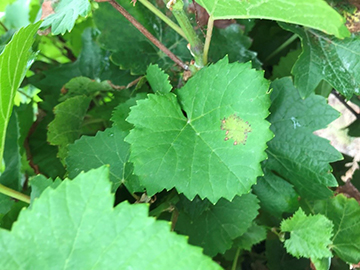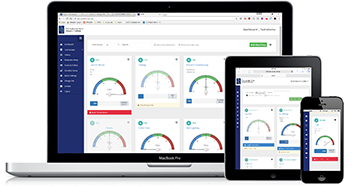Grapevine virus testing and elimination
Advances in dissolved gas management
Results from AWRI Vineyard and Winery Practices Survey
Research reports available from AWRI website
Optimise ferments in vintage 2018
Order the latest AWRI staff publications online
Celebrating 25 years of the Advanced Wine Assessment Course |
|
 |
The AWRI and the University of Adelaide recently annouced an agreement to transfer the grapevine virus testing and elimination services previously provided by Waite Diagnostics to the AWRI. The services offered, which include testing for 12 grapevine viruses and phytoplasmas, as well as other pathogens responsible for crop diseases, will continue to be provided by the same experienced personnel, including virologist Dr Nuredin Habili. Dr Habili has more than 20 years’ experience working with plant viruses and has been involved in the research and development of the services provided. In addition to identification services, elimination of deleterious viruses from grapevines using chemotherapy is also available. More detailed information and sampling requirements can be found on the virus testing page of the AWRI website. The virus testing team can be contacted on 08 8313 7426 or commercialservices@awri.com.au. |
Advances in dissolved gas managementAutomated dissolved gas management systems using membrane contactors for gas transfer have recently been introduced to the Australian wine industry. They potentially allow for faster and more precise dissolved gas adjustment and reduced gas consumption. AWRI Senior Engineer, Simon Nordestgaard, recently published an article in the January issue of Australian & New Zealand Grapegrower & Winemaker reviewing how these technologies work and comparing them with alternatives: Click here to access the article. |
|
Results from AWRI Vineyard and Winery Practices SurveyA major survey of Australian vineyard and winery practices was conducted in late 2016. Around 690 responses were received, covering 19% of Australia’s vineyard area and 74% of tonnes processed. Thanks are extended to all producers that participated. Follow-up visits were performed during 2017 to provide context to industry trends, and a final report will be issued later this year. This is one of the most comprehensive surveys ever taken in the Australian grape and wine sector and it is intended to be repeated at regular intervals so that trends in technology adoption and practice change can be tracked over time. Preliminary vineyard data was presented at the ASVO seminar in August where it formed the basis for a panel discussion on the take-up of technologies such as mechanised cane pruning, treatment of pruning wounds, recycle sprayers, mechanical leaf plucking, precision viticulture and destemming harvesters. Preliminary winery data was presented at the Crush Symposium in November, including information on the take-up of cross-flow filtration, flotation, and different heat and cold stabilisation techniques. Click here to access a pdf of the most recent survey presentation. For more information, contact Simon Nordestgaard on simon.nordestgaard@awri.com.au or 08 8313 6600. |
|
Research reports available from AWRI websiteIn late December 2017, Wine Australia approved the AWRI’s Final Reports for projects conducted in 2013-2017. Those reports are now available for download (8 MB pdf file) from the RDE projects page on the AWRI website. That same page also provides a list of the AWRI’s current research, development and extension projects. For more information, please contact Ella Robinson on ella.robinson@awri.com.au or 08 8313 6600. |
|
Optimise ferments in vintage 2018 |
|
 |
The online AWRI Ferment Simulator has been updated for vintage 2018 and is available through the WineCloud. This free app uses powerful algorithms to model ferments as they progress and predict problems before they occur. A number of improvements have been made for 2018 based on user feedback, including the calculation of ferment rate and peak rate. For more information and to register for an account, visit the Ferment Simulator webpage. |
Events across AustraliaThe AWRI is visiting 17 regions in January/February to deliver tastings and workshop events before vintage 2018 gets into full swing. The ‘Shiraz winemaking trials tasting workshop’ being presented across Australia showcases how different winemaking practices can influence final wine style. Fifteen different wines have been made from the same batch of Shiraz grapes using a range of different harvest dates and winemaking techniques. Tasting these wines is a great opportunity to explore the stylistic and compositional differences achieved when one winemaking variable is changed at a time. In Victoria the Shiraz tasting is being combined with a ‘Pre-vintage workshop’ in three locations, which presents a range of practical tips to make the most of the upcoming vintage. In Tasmania, an ‘Addressing regional challenges’ workshop will be presented in Launceston and Hobart in mid-February. This workshop includes information on the latest technologies, analyses, process options and efficiencies to enable optimal quality grapegrowing and winemaking, with specific topics selected by the regional association. Visit the AWRI events calendar now for a full list of upcoming events or contact the events team on events@awri.com.au or 08 8313 6600. |
|
Order the latest AWRI staff publications onlineAccessing the latest AWRI publications is easy. Visit the AWRI Publications web page to:
A list of AWRI publications published since the last eNews is included below: 1966 Jayokody, H., Liu, S., Whitty, M., Petrie, P. Microscope image based fully automated stomata detection and pore measurement method for grapevines. Plant Meth. 13(94): 1-12; 2017. 1967 Bekker, M.Z., Wilkes, E.N., Smith, P.A. Evaluation of putative precursors of key ‘reductive’ compounds in wines post-bottling. Food Chem. 245: 676-686; 2017. 1968 Stockley, C. Ask the AWRI: Wine – a weighty issue. Aust. N.Z. Grapegrower Winemaker (646): p. 44; 2017. 1969 Cowey, G., Coulter, A., Wilkes, E. Top tips for wine stabilisation. Aust. N.Z. Grapegrower Winemaker (644): p. 71; 2017. 1970 Longbottom, M. Ask the AWRI: biosecurity and viticulture. Aust. N.Z. Grapegrower Winemaker (647): 44-45; 2017. 1971 Johnson, D. 2017 Report. Aust. N.Z. Grapegrower Winemaker (644): 4p.; 2017. 1972 Rinaldo, A., Bartowsky, E., Amos, J., Scrimgeour, N. Rapid assessment of wine yeast variability and vitality. Wine Vitic. J. 32(6): 18-21; 2017. 1973 Capone, D., Francis, L., Williamson, P., Herderich, M., Johnson, D. Struck match, freshness and tropical fruit: thiols and Chardonnay flavour. Wine Vitic. J. 32 (5): 31-35; 2017. 1974 Dry, P. Mondeuse noire. Wine Vitic. J. 32(5): p. 57; 2017. 1975 Pearson, W. Ladder of development: How scientific principles can help you refine your business. Thought Leadership 1: 80-85; 2017. 1976 Li, S., Wilkinson, K.L., Bindon, K.A. Compositional variability in commercial tannin and mannoprotein products. Am. J. Enol. Vitic. doi: 10.5344/ajev.2017.17057: 1-25;2017 1977 Longbottom, M. ASVO announces 2017 AWAC scholarship winner and Winemaker of the Year finalists. Wine Vitic. J. 32(5): 10-11; 2017. 1978 Dry, P. Barbera. Wine Vitic. J. 32(6): p. 52; 2017. 1979 Pastor, R.P., Restani, P., Di Lorenzo, C., Orgiu, F., Teissedre, P-L., Stockley, C., Ruf, J.C. Quini, C.I., Tejedor, N.G., Gargantini, R., Aruani, C., Prieto, S., Murgo, M., Videla, R., Penissi, A., Iermoli, R.H. Resveratrol, human health and winemaking perspectives. Crit. Rev. Food Sci. Nutr. DOI: 10.1080/10408398.2017.1400517: 1-19; 2017. 1980 Sadras, V.O., Moran, M.A., Petrie, P. Resilience of grapevine yield in response to warming. OENO one 51(4): 381-386; 2017. 1981 Coulter, A. Ask the AWRI: volatile acidity. Aust. N.Z. Grapegrower Winemaker (648): p. 16; 2018. 1982 Abbott, T., Wilkes, E. Predicting outcomes: learning about ferments from big data. Aust. N.Z. Grapegrower Winemaker (648): 54-55; 2018. 1983 Nordestgaard, S. Gains in speed, labour and gas consumption for winemakers: membrane contractors for management of dissolved oxygen and carbon dioxide. Aust. N.Z. Grapegrower Winemaker (648): 61-67; 2018. 1984 Stockley, S. Where’s the limit? Drinking guidelines around the globe. Aust. N.Z. Grapegrower Winemaker (648): 58-60; 2018. 1985 Hranilovic, A., Li, S., Boss, P.K., Bindon, K., Ristic, R., Grbin, P.R., van der Westhuizen, T., Jiranek, V. Chemical and sensory profiling of Shiraz wines co-fermented with commercial non-Saccharomyces inocula. Aust. J. Grape Wine Res. DOI: 10.1111/ajgw.12320: 1-15; 2017. 1986 Pereira-Caro, G., Ordóñez, J.L., Ludwig, I., Gaillet, S., Mena, P., Del Rio, D., Rouanet, J-M., Bindon, K.A., Moreno-Rojas, J.M., Crozier, A. Development and validation of an UHPLC-HRMS protocol for the analysis of flavan-3-ol metabolites and catabolites in urine, plasma and feces of rats fed a red wine proanthocyanidin extract. Food Chem. 252: 49-60; 2018. |
|
AcknowledgementThe AWRI acknowledges support from Australia’s grapegrowers and winemakers through their investment body, Wine Australia, with matching funds from the Australian Government. The AWRI is a member of the Wine Innovation Cluster in Adelaide, South Australia. |
|

